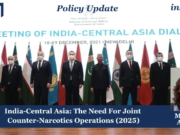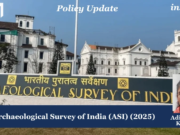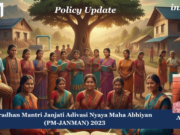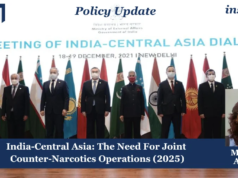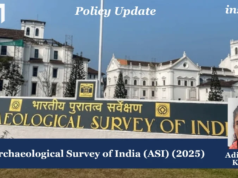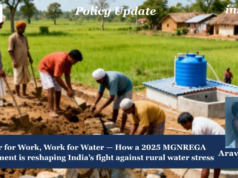Policy Update
Alisha Mehra
Background
The Urban Development Fund (UDF) was established by the Government of the National Capital Territory of Delhi (GNCTD) in 1994 to address the growing needs for better urban infrastructure. In 2016, the Ministry of Housing and Urban Affairs (MoHUA) issued another set of operational guidelines. The fund originated from Delhi’s transformation of property ownership. Previously, most properties operated under a leasehold system where residents held long-term usage rights while the Delhi Development Authority (DDA) retained ownership.
In 1992, the Government of India allowed conversion to freehold properties through one-time conversion fees. This created a funding mechanism where specific revenue streams supported urban development through revenue recycling.
UDF is also central in bridging central and state schemes. MoHUA oversees the fund through DDA, while GNCTD departments and local bodies propose projects under UDF guidelines.
Functioning
UDF operates through a Project Sanctioning Committee (PSC) comprising senior officials from the Secretary (Urban Development), the Chief Secretary of the Delhi Government, and representatives from relevant ministries and DDA. The fund provides targeted financial assistance for urban development, focusing on congestion relief in the National Capital Territory. The fund’s priority sectors are the following:
- Transportation: Includes the construction of newer Roads, flyovers, bicycle sharing, multi-modal integration, and Intelligent Transport Systems
- Sanitation: Sewage treatment, solid waste disposal, storm water drainage
- Water: Conservation, recycling, and distribution
- Power: Renewable energy, distribution, energy efficiency
- Social Infrastructure: Primary Health Centres, educational institutions for economically weaker sections
Process
Agencies submit detailed project reports (DPRs) to DDA. The Engineering and Finance Wing conducts technical and financial appraisals examining viability, feasibility, costs, environmental compliance, and operational arrangements. They then recommend the project to the UDF’s PSC, which then reviews and approves funding terms. Projects require 20% matching funds from implementing agencies, though PSC may waive this requirement for public interest.
Budget & Performance
The 2025-26 Union Budget allocated ₹96,777 crore for urban development, a 17% increase in the broader national urban development sanctioning. According to MoHUA, UDF disbursements to DDA totalled ₹2,173.81 crore from 2019-20 to 2023-24. Currently, 22 projects are under implementation covering traffic, drainage, sanitation, and environmental interventions. Some of the projects are listed below.
- Transportation – Under the Transport/traffic spending, multi-model projects are being undertaken, ranging from hybrid-grade separators to green mobility infrastructure. The new grade separators and flyovers, among others, are geared toward relieving congestion and improving connectivity across key corridors. Some projects under the same are
- Flyover/ROB on UER-I at Narela – It was sanctioned by the UDF on the Urban Extension Road I at Narela (North Delhi) with a total estimated cost of Rs 437.21 Cr, where 80% (~Rs 349.77 Cr) is funded through UDF and the remaining 20% (~Rs 87.44 Cr) by the local authority.
- Commercial Hub Improvements – Road reconfiguration at Nehru Place and Bhikaji Cama Place for enhanced traffic flow and pedestrian safety
- Delhi Cycle-Walk Network Phase I – 36 km of dedicated cycle tracks and pedestrian pathways approved by UDF PSC. The project is funded under UDF guidelines, with detailed proposals submitted to the DDA PSC.
- The Mathura Road Integrated Transit Corridor – A nearly 1 km tunnel beneath Pragati Maidan on Mathura Road has been sanctioned within the larger construction of an Integrated Transit Corridor development plan, with the aim to decongest a major arterial connecting the convention center and airport. UDF has allocated Rs 738.53 Cr toward this project.
- Drainage and Water Management – Here, infrastructure investments aim to mitigate monsoon flooding and improve sewage resilience across rapidly urbanising parts of the city. Some projects under the same are:
- Storm/Drainage Network in Dwarka and Rohini – UDF-funded drainage rehabilitation projects have been sanctioned to tackle urban flooding. The combined project cost is approximately Rs 278.2 Cr, with 80% funded through UDF (approx. Rs 222.6 Cr) and the remaining 20% met locally
- Nod (Kirari) to Rithala Trunk Drain – A major trunk drain project worth ₹264.5 crore project enhancing stormwater discharge capacity in flood-prone areas.
- Sewerage Infrastructure – Delhi Jal Board secured ₹237.29 crore for peripheral sewerage rehabilitation and capacity enhancement under the UDF framework.
- Solid Waste Management – Solid waste management and sanitation grants support the modernization of the waste value chain through equipment procurement, scientific processing, and enhanced sanitation infrastructure. Some grants under this were –
- North Delhi Municipal Corporation Modernization – In 2019, a Rs 300 Cr package was approved under UDF (80% funded) to modernize waste management in North Delhi Municipal Corporation (city-SP zone). This package funded the procurement of mechanized road sweepers, sprinkler vehicles, litter-control systems, and biogas/compost units.
- Zone-Specific Enhancements – Grants totalling Rs 414 Cr (UDF share) were sanctioned to improve primary/secondary collection depots, introduce pollution monitoring, and deploy waste-processing equipment in South, East, and North DMC zones.
- Housing Development – UDF aims to address the challenge of finding affordable housing solutions in Delhi, especially for economically weaker sections (EWS) and lower-income groups, by providing capital expenditure grants for large-scale infrastructure projects.
- DDA Sata Ghar Housing Scheme (2024) – It was launched in 2014, where 34,000 flats were offered on a first-come, first-served basis with prices starting from ₹11.5 lakh for entry-level units.
- DDA Sabka Ghar Awas Yojana (2025) – It has been very recently launched. The expansion is of 500 new EWS flats in Narela to address the overwhelming demand for affordable housing in outer Delhi.
- Urban Challenge Fund 2025 – It is a new category that has been included in the budget for 2025-26. The budget allocation is of ₹100 billion for 2025-26. This amount will be spent on three core focus areas:
- Development of cities as economic growth hubs
- Creative redevelopment of existing urban areas
- Enhanced provisions for safe water and sanitation infrastructure
Impact
UDF investments have driven gradual transformation in Delhi’s urban infrastructure, aligning with the Master Plan for Delhi 2021 and Delhi 2041 frameworks. Some benefits have been highlighted below –
- Transport projects in terms of newer roads and flyovers have significantly reduced congestion at key choke points, cutting travel times for commuters and commercial transport. The newer Delhi Cycle Walk Phase I aims to remove millions of car rides from Delhi roads, promoting low-emission mobility and safer pedestrian infrastructure, particularly for short trips (0-5 km) in some areas.
- Around ₹300 crore SWM modernization has also enabled MCDs to deploy mechanized sweepers and sprinkler trucks, reducing road dust (key PM10 and PM2.5 sources), establish decentralized composting and biogas plants, and install smart litter bins. These improvements, along with better garbage collection regularity, are operational in central commercial zones.
- Over ₹500 crore is invested in stormwater drainage across Dwarka, Rohini, and Kirari-Rithala corridors to address monsoon waterlogging through enhanced trunk and peripheral drainage capacity, which handles extreme rainfall events, reduces vector-borne diseases by minimizing stagnant water, and strengthens sanitation in informal colonies.
Emerging Issues
The UDF approach in Delhi is strategically focused on hard infrastructure – roads, drainage, civic services – but challenges across coordination, implementation speed, institutional clarity, and developmental breadth limit its full potential. Some of the problems are listed below –
- Coordination Challenges – Approval and land acquisition delays slow project progress. Political tensions arise. For example, MoHUA publicly criticized the Delhi government for “non-cooperation” on flyover projects, risking incomplete assets.
- Implementation delays – Many projects remain under construction despite foundation stone ceremonies. Progress often lags behind schedules for projects like the Shivaji Bridge underpass and foot-over-bridges.
- Scope gaps – UDF excludes operations and maintenance funding, requiring agencies to allocate separate O&M budgets that risk infrastructure degradation. The fund primarily finances physical infrastructure with limited provision for social development, housing, or poverty alleviation projects.
- Institutional complexity
- DDA manages centrally-funded UDF while local agencies execute projects, obscuring accountability and financial oversight.
- Grant releases require Utilization Certificates, often causing chronic delays in successive phase funding.
- Transparency gaps exist – while project lists are public, detailed outcome reports and post-implementation performance data remain inconsistently documented.
Way Forward
With reduced allocations for certain urban schemes and emphasis on bankable projects attracting private investment, stakeholders must find new ways to maximize impact. Some suggestions are given below –
- Improving Institutional Efficiency & Strategic Alignment
- Digital transformation for expedited UDF appraisal/approval cycles with real-time project tracking
- Climate-resilient project prioritization aligning with AMRUT 2.0’s circular water economy focus.
- Streamlined multi-agency coordination through relaxed matching requirements and fast-track mechanisms
- Optimized fund releases, maintaining construction schedules, and project viability
- Proactive Project Development
- Integrated planning leveraging DDA’s comprehensive project preparation capabilities for housing, commercial land, and public facilities
- Early commitment mechanisms aligning national priorities with funding commitments to unlock additional central funding
- Performance-based releases with robust utilization reporting for prompt tranche releases
- Capacity Building and Innovation
- Enhanced technical capacity through project management cells navigating complex funding architectures
- PPP model exploration using UDF as viability-gap funding for innovative projects aligned with the government’s emphasis on bankable urban infrastructure
- Citizen engagement platforms ensure transparency and community participation in UDF-funded projects
- Modular implementation strategies with flexible bidding mechanisms for complex facilities, ensuring scalability and adaptability
References
- Aijaz, R. (2024, February 7). Urban development directions in the 2024-25 budget. ORF Online. https://www.orfonline.org/expert-speak/urban-development-directions-in-the-2024-25-budget
- Basic Home Loan. (2023, September 23). DDA housing scheme. https://www.basichomeloan.com/blog/real-estate-news/dda-housing-scheme
- Business Standard. (2023, April 4). Delhi cabinet approves plan to make city roads free of dust pollution. https://www.business-standard.com/india-news/delhi-cabinet-approves-plan-to-make-city-roads-free-of-dust-pollution-123040401151_1.html
- Comptroller and Auditor General of India. (2018). Chapter III: Implementation of selected projects. In Report of the Comptroller and Auditor General of India on Local Bodies, Government of National Capital Territory of Delhi, for the year ended 31 March 2017 (pp. 75–123). https://cag.gov.in/uploads/download_audit_report/2018/7_Chapter-III-05f71ad81104603.48126108.pdf
- Delhi Development Authority. (n.d.). Official website. https://dda.gov.in/
- Delhi Development Authority. (2018). Bid letter for cycle walk [Tender document]. http://ddaservices.dda.org.in/tendernotices_docs/july2018/Bid%20Letter%20for%20CycleWalk29012020.pdf
- Delhi Development Authority. (2020). UDF details for loading on website of DDA1. https://dda.gov.in/sites/default/files/Accounts/UDF%20details%20for%20loading%20on%20WEBSITE%20of%20DDA1.pdf
- Delhi Development Authority. (2022, February 8). Zonal development plan for Zone L (South West Delhi), Sub-Zone LOP-08. https://dda.gov.in/sites/default/files/architecture/DCW_Delhi_01_LOP08022022.pdf
- Lok Sabha Secretariat. (n.d.). AU561_tPpxzC.pdf (Annexure to a Lok Sabha Question). Sansad.in. https://sansad.in/getFile/loksabhaquestions/annex/182/AU561_tPpxzC.pdf?source=pqals
- Ministry of Housing and Urban Affairs. (2016). UDF operation and management guidelines. https://mohua.gov.in/upload/uploadfiles/files/UDF-Guidelines-2016.pdf
- Ministry of Housing and Urban Affairs. (2018, October 22). Urban development fund (UDF) [Press release]. Press Information Bureau (PIB), Government of India. https://www.pib.gov.in/PressReleasePage.aspx?PRID=1549676
- Ministry of Housing and Urban Affairs. (2021). Annual report 2020-21. Government of India. https://mohua.gov.in/upload/uploadfiles/files/Annual_Report_2020_21_MoHUA_EnglishVersion%20(Final).pdf
- Ministry of Housing and Urban Affairs. (n.d.). Decongesting traffic in Delhi: A study. https://mohua.gov.in/upload/uploadfiles/files/Decongesting_TrafficDelhi06.pdf
- Ministry of Women and Child Development. (2021, April 4). Empowerment of women self help groups (SHGs) under Deendayal Antyodaya Yojana – National Rural Livelihoods Mission (DAY-NRLM) [Press release]. Press Information Bureau (PIB), Government of India. https://www.pib.gov.in/PressReleasePage.aspx?PRID=1709838
- Times of India. (2024, December 20). DDA’s major drainage overhaul revitalizes Dwarka, no more waterlogging. https://timesofindia.indiatimes.com/city/delhi/ddas-major-drainage-overhaul-revitalizes-dwarka-no-more-waterlogging/articleshow/116145213.cms
- Times of India. (2025, February 24). Inauguration of Shivajinagar rail underpass today: Finally. https://timesofindia.indiatimes.com/city/aurangabad/inauguration-of-shivajinagar-rail-underpass-today-finally/articleshow/118257853.cms
About the contributor:
Alisha Mehra is a research intern at IMPRI. She is currently pursuing an Integrated BA-MA in Development Studies from IITM.
Acknowledgement:
The author sincerely thanks Aasthaba Jadeja and IMPRI fellows for their valuable contribution.
Disclaimer:
All views expressed in the article belong solely to the author and not necessarily to the organization.
Read more at IMPRI:
Empowering Citizens Digitally: The Role of the National Portal of India
Beti Bachao Beti Padhao 2015: Hope in Headlines or Change on Ground?


